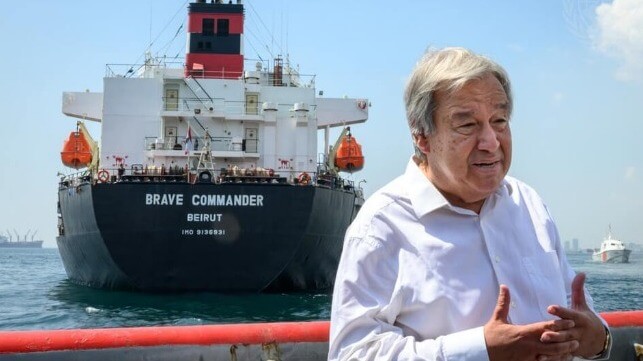UN Confirms 60-Day Extension for Black Sea Grain Exports

The United Nations has confirmed statements earlier today from Turkish President Erdogan announcing that the Black Sea Gain deal has been extended. The president said that the deal to export gains would be extended for two months while reporting that Russia has also agreed not to prevent commercial ships trapped since the start of the war in Ukraine from departing.
Speaking to reporters in New York, UN Secretary-General António Guterres said, “We have some positive and significant developments – confirmation by the Russian Federation to continue its participation in the Black Sea Initiative for another 60 days…even in the darkest hours, there is always a beacon of hope and an opportunity to find solutions that benefit everyone.”
The previous 60-day extension was due to end tomorrow, May 18, with Russia saying it would not participate if its demands to improve conditions for Russian exports were not addressed. Russia wanted to add ammonia exports and was also demanding that it again be given access to the international financial system for payments for these exports. Talks at the end of last week reportedly showed little progress but the UN and Turkey said they would continue the dialog and that technical discussions were ongoing.
Confirming the extension, Guterres however cautioned that there are outstanding issues. He said representatives of Russia, Ukraine, and Turkey, along with the UN, will keep discussing the issues. He however also hailed the success of the program that began in August 2022. Data from the UN’s Joint Coordination Center in Istanbul which oversees the implementation of the agreement and vessel inspections shows that 30.3 million metric tons of gains and foodstuffs have been exported under the program. It includes 625,000 tons for the UN’s World Food Program but the largest share of the exports has gone to China. Corn followed by wheat has made up the majority of the exports.
Guterres noted that over the last year, markets have stabilized, volatility has been reduced, and global food prices have fallen by 20 percent.
The JCC reports that a total of 1,085 outbound voyages have been completed in the just over nine months the program has been in effect. However, with reports of a lack of cooperation from Russia, inspections and permits had dwindled this month. Only a total of 11 ships had been permitted to sail to Ukraine this month with the last permit being issued on May 6 for an inbound trip. The final ship, DSM Capella (37,000 dwt) registered in Barbados, departed Chornomorsk, on May 17. Only one ship a day had departed on the three final days and a total of 33 ships for the month. The JCC reports there are still five ships waiting for their outbound inspections.
“We will continue our efforts to ensure that all the conditions of the agreement are fulfilled and that it will continue in the next period,” the Turkish president said in his statement. “In addition, our Russian friends stated that they will not prevent the exit of Turkish ships in Mykolaiv and Olvia ports. We are grateful to them for this.”

that matters most
Get the latest maritime news delivered to your inbox daily.
It is unclear how many vessels and from which ports will be repatriated under the current agreement. Several shipping companies had withdrawn their crews largely abandoning ships caught in some of the ports.
The UN said it hopes that food and fertilizers, including ammonia, from the Russian Federation and Ukraine will be able to reach global supply chains and predictably.
